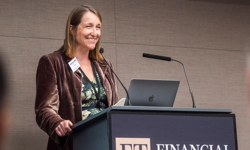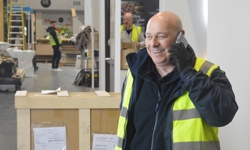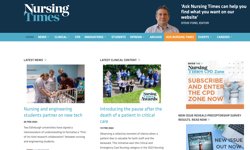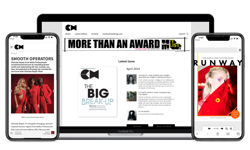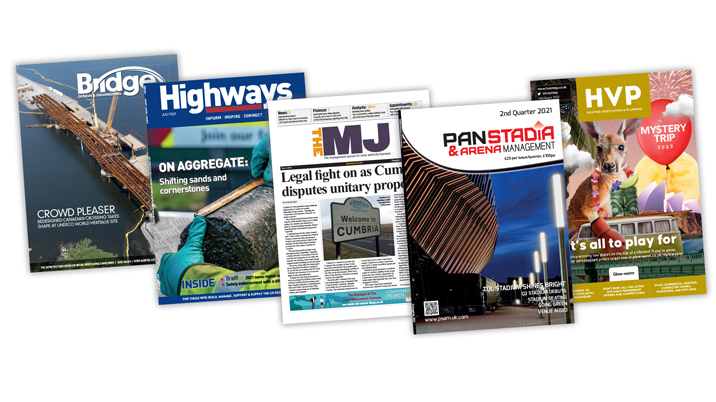
Enforced lockdowns then stop-start re-openings due to Covid-19 made 2020 a grim year for B2B publisher Hemming Group, as it did for many. But the pandemic has also proved to be a catalyst for change, Nick Service, chairman of the family owned privately-run B2B publishing and events company explains.
“Our financial year runs from the start of July to the end of June, so we lost the last quarter of 2019/20,” he says.
“And with half our income coming from events – conferences, exhibitions, and awards, (the balance of revenue coming mainly from on-page advertising) – we hoped like everyone to resume live events last autumn but that didn’t happen, then this spring but that didn’t happen.

“It was painful.”
Yet the pandemic has also been an eye-opener, too, in a good way.
For a start, it focused attention on the need to find new ways of monetising quality content – something the leadership team was considering pre-pandemic but yet to fully address.
“Suddenly, people at all levels within the company realised that relying on advertising and exhibition stand sales leaves you very vulnerable,” says Service.
Hemming Group has more than 50 years’ experience of organising trade fairs, conferences, and events, including Traffex at the NEC and the London Wine Fair at Olympia.
We are in business to create quality content that helps the businesses in the sectors we serve improve their business.
Event monetisation
Following a re-organisation of the business six years ago – which saw the company merge its publishing and events divisions into one and re-orientate to be market-focused and sector-driven, and then a rationalisation of titles to focus on the strongest and most profitable – work on refining its events monetisation strategy had already begun.
“Conference delegates had always been asked to pay, but we started to make money from the seminars we’ve always run around our big exhibitions,” he continues.
Then two years ago, Hemming Group started charging certain attendees to get into one of its exhibitions – the annual London Wine Fair trade exhibition at London’s Olympia.
“Go to a trade exhibition on the continent and you pay an entry fee, everywhere,” Service presses on.

“In Britain for some reason, most have always been free to enter with all the money generated coming from the exhibitors. So, for the London Wine Fair in 2019, we started charging non-wine buyers £50 to come, which had two benefits: a nice amount of cash, and it cleared out the time-wasters.”
It is an approach the company is now rolling out for its other exhibitions as live, in-person events resume.
Another eye-opener was the success of the virtual events Covid-19 forced Hemming Group to create from scratch – a number of which the company now plans to continue – which, in turn, underlined the opportunities of digital.
Service points to the annual bridge maintenance conference it holds each year for around 50 bridge engineers, in Scotland, which last year attracted 1,000 delegates virtually. And this underlined the importance of stepping up content publishing monetisation strategies.
The Hemming portfolio
The Hemming Group portfolio includes thirty B2B titles – such as Highways Magazine and Builders’ Merchant News – as well as websites and trade directories serving sectors such as international firefighting and prevention, bridge construction and maintenance, building services, and UK government.
Its oldest title is TheMJ, or The Municipal Journal – the UK’s leading weekly magazine for council chief executives and their teams of decision-makers in local authorities and allied sectors.
The Municipal Journal was launched more than 125 years ago by Sir Robert Donald, one-time editor of the Daily Chronicle and a specialist in – among other things – investigations into local government in London.
Part of Hemming Group’s local government network of titles, TheMJ sits alongside LocalGov, Transport Network, and sister title MYB Municipal Year Book (another title launched by Sir Robert, who eventually passed on the business to Service’s grandfather).
Service joined Hemming Group in 1988, launching the magazine marketing department, then becoming general manager of the directories publishing division and, eventually, working as group managing director from 1995 to 2002.
He then moved to Madrid where he worked in a series of independent business and consultancy roles before returning to Hemming Group as chairman, a role previously held by his mother and uncle, in 2015.
“Before the pandemic, all the websites were up and running, all the journalists were writing for the web, we published e-newsletters and all that, and took the key stories to lay out and print weekly, monthly, or quarterly according to what best suited each sector,” he says.
“We are in business to create quality content that helps the businesses in the sectors we serve improve their business.
“But only two of our publications are subscription-based – the rest are controlled circulation. So, we have quality editorial, and we are well-respected in our industries, but we are giving much of that quality content away for free.”
Each publication will move at a speed appropriate to its sector and adopt the style or model most applicable to its audience.
Paywall strategies
To address this, Hemming Group is now putting together a carefully considered paywall strategy it intends to roll out across all titles over the next three to five years.
“Each publication will move at a speed appropriate to its sector and adopt the style or model most applicable to its audience,” Service explains.
He envisages three different paywall strategies – including a pay per view-style offer for those such as small business owners not yet ready to commit to an annual subscription.
“It’s all about changing the mindset, which comes from clear and consistently communicating the quality and value of your product, and nudging people. And it’s doable,” he says.
Organic growth
Hand in hand with this strategy is an ambition to further grow the business organically.
With new monetisation models in place, it will be easier to launch new products, Service believes, which is how he now hopes the company – which in the past has expanded through acquisition – will grow.
“We now want to focus on organic growth and feel we have a lot of potential around our existing products and feel we can leverage our brands more effectively,” Service continues, citing the company’s recently launched conference dedicated to esports venues.
That event was inspired by a series of conferences Hemming Group set up and ran in Japan, to help venue organisers upgrade their facilities in countdown to the Tokyo 2020 Olympics, which, in turn, were a spin-off from PanStadia & Arena Management Magazine, which the company acquired five years ago.
Also important, however, will be an imminent upgrading of many of the systems Hemming Group uses on its IT platform along with a renewed focus on engaging and inspiring the company’s 105-strong workforce, Service adds, to engage everyone with the new business plan.
“Some of our systems are quite antiquated and we are in the process of upgrading those – it’s an area we haven’t invested enough in historically,” he says.
“The IT is fine, but some of the systems we have on it – databases and so on – are a bit out of date, and that’s why the focus over the next year and a half will be to update the systems, so all the new ideas that we expect to come out, we can do smoothly.”
It’s about encouraging an atmosphere of experimentation and trying out new ideas.
Company culture
Service adds: “The biggest challenge (to the organic growth plan) is encouraging the teams on the ground to expand their views of their world. There’s still a lot of traditional print on paper and exhibition or conference thinking.
“But Covid-19 has opened up people’s ideas and now is the time to extend this further.
“It’s about encouraging an atmosphere of experimentation and trying out new ideas, and if those ideas don’t work, understanding why and whether you can fix it and, if you can’t, failing quickly and moving on.
“It’s about developing our staff in this new way of thinking.”
Mentoring will play an important role in this. Creating safe space for people to question and float ideas, however, will also be important.
“It’s about encouraging the managers – the brand leaders, sector leaders, even line managers – to say, that’s not a silly idea, we may have to adapt it but let’s look at it in more detail,” Service continues.
“We’ve never had a structured approach to developing new products and that’s something we are looking at developing at the moment as a senior management team.”
One major goal, he adds, is for sustainable profit growth and a doubling of income within the next five years.
Improved staff productivity is another.
Working from home has demonstrated both how well the day-to-day management of publications and events can be done remotely with computing and connectivity and how important getting together is – both for creative ideation and personal wellbeing.
Moving forward, staff will be encouraged to work flexibly. How this will work best will evolve, but one thing he is clear on is the inextricable link between wellbeing and productivity.
“One of the challenges we’ve had while people have been working from home has been reining back some of our staff,” he says.
“There is always more to do, but if you drive yourself on and on you won’t be as effective. We don’t want people burning out. The people we work with are people who we care about. And the way we will use flexible working should make a big difference.
Service continues: “One side of me thinks in five years’ time, we will have forgotten about the pandemic and working from home and be stuck again on the nine to five commute. But the other side says, it doesn’t have to be that way – we can do things differently.
“For that to happen, we need determination and leadership from the top and a clear understanding that productivity is not necessarily connected to how many hours you work, it’s how you use your time.”
Get this right and it will surely be another building block for ensuring Hemming Group’s future success in a publishing sector which over the past eighteen months, he believes, has more than proven its worth.
“Publishing as a whole – B2B publishing, especially – has been really effective during the pandemic. Our role is to provide our markets with information about what’s happening, and there’s been plenty of that,” Service says.
“As a whole, our markets have really appreciated that. We kept on going. We stood beside them. And thanks to the quality content we provide, they have stood by us.”
Productivity is not necessarily connected to how many hours you work, it’s how you use your time.
This article was first published in InPublishing magazine. If you would like to be added to the free mailing list, please register here.







